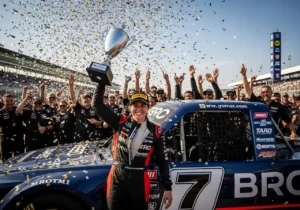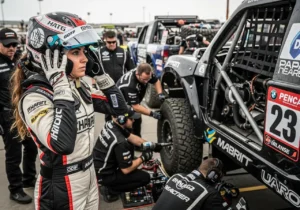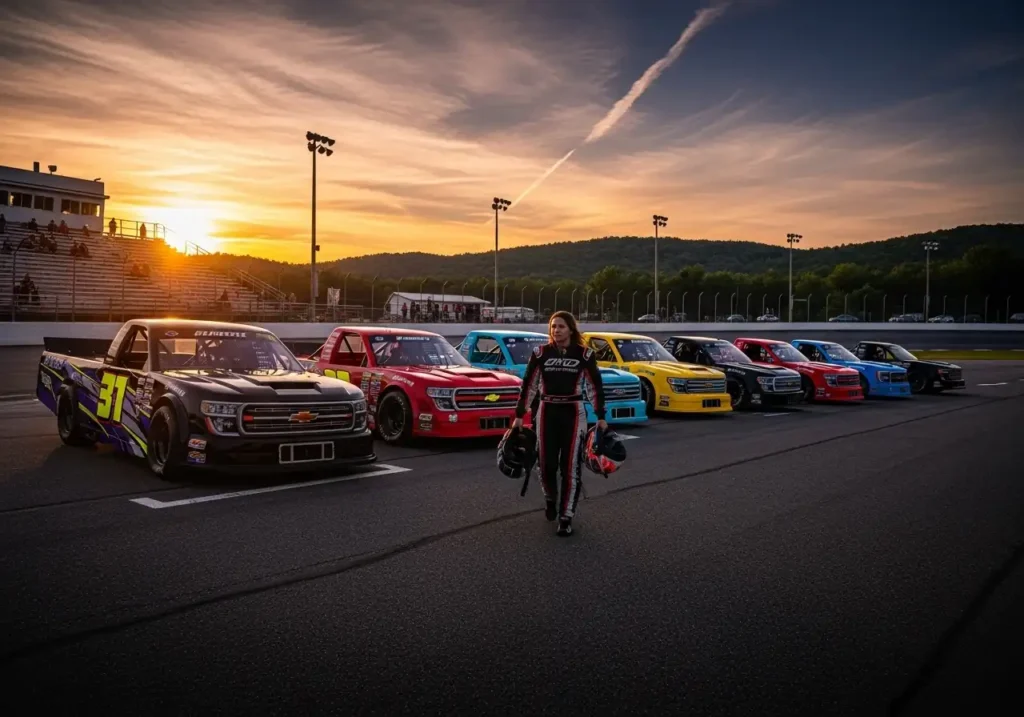Short-track racing in New England has always been about grit, competition, and community. Over the years, the New England Truck Series has produced countless moments that celebrate passion and perseverance. But lately, there’s another storyline unfolding—one that’s redefining the face of local motorsport. A growing number of women drivers are making their mark on the short-track truck racing scene, proving that talent, courage, and determination know no gender.
Breaking Barriers in a Traditionally Male-Dominated Sport
For decades, motorsport has been viewed through a masculine lens—heavy machinery, physical endurance, and fierce rivalries under the lights. Yet women have always been part of the racing story, from early pioneers like Janet Guthrie and Lyn St. James to today’s national stars such as Hailie Deegan. Now, that same movement is gaining traction on the regional level right here in New England.
Across short tracks from Connecticut to Maine, more women are suiting up, strapping in, and racing head-to-head with the men. In the New England Truck Series, they’re not just participating—they’re competing for podiums, earning respect, and inspiring the next generation of racers.
What’s Driving the Change?
Several factors are fueling this rise in participation. Accessibility, evolving attitudes, and community support have all played a part:
- Grassroots accessibility: Short-track racing remains one of the most approachable forms of motorsport. Family-run teams, local sponsorships, and regional tracks make it feasible for newcomers to get started.
- Shifting perceptions: The racing community has become more inclusive. Fans and teams are celebrating skill and sportsmanship rather than focusing on stereotypes.
- Mentorship and visibility: Established female racers are mentoring younger drivers, offering advice, sponsorship guidance, and encouragement.
- Media and social engagement: With platforms like Facebook Live and series streaming partners, fans now see more diverse driver profiles and race coverage than ever before.
Profiles in Perseverance: Women Leading the Charge
 While the movement is growing, a few names stand out as trailblazers in regional truck racing. Whether they’re seasoned competitors or rising rookies, their stories share a common thread—unrelenting passion for the sport.
While the movement is growing, a few names stand out as trailblazers in regional truck racing. Whether they’re seasoned competitors or rising rookies, their stories share a common thread—unrelenting passion for the sport.
Many have come up through local karting, quarter-midget, or mini-stock programs, honing their craft before moving into trucks. Each has faced challenges along the way, from funding obstacles to skepticism. Yet their results, consistency, and composure on the track are proving that they belong in any racing conversation.
These women aren’t just changing perceptions—they’re elevating competition. Their approach to racecraft, precision driving, and team communication has raised the overall level of the field, pushing every driver to improve.
Why Representation Matters in Racing
Representation is about more than numbers. It’s about visibility and the message it sends to young fans who love the sport. When a girl in the grandstands sees a female driver battling for position under the lights, she’s reminded that motorsport is for anyone who has the passion to compete.
The presence of women in short-track racing also enriches the sport culturally. It broadens the fan base, attracts new sponsors, and promotes community growth. Sponsors increasingly value diversity and inclusivity, and supporting women drivers aligns with that vision. The result is a win-win—stronger representation and new financial opportunities for teams and series alike.
The Competitive Edge: How Women Are Changing Racing Dynamics
On the track, success isn’t about brute strength—it’s about precision, focus, and feel. Many women drivers bring a distinctive style that emphasizes smooth inputs, consistent lap times, and strategic patience. In truck racing, where setup balance and tire management are critical, those traits can be a real advantage.
Veteran crew chiefs often note that female drivers tend to give highly detailed feedback about handling and setup adjustments, which helps engineers fine-tune trucks for performance. In an environment where every tenth of a second matters, that communication makes a difference.
Community Support and Mentorship
Racing has always been a family-driven sport in New England. Behind every truck on the grid are teams, sponsors, and local businesses who believe in their drivers. As more women enter the sport, community support has grown stronger. Parents, coaches, and fellow racers are stepping up as mentors, offering resources, safety training, and sponsorship introductions.
Programs at local short tracks are also making an impact. Youth development series and “Ladies Night” events encourage more female participation, whether in driving, pit-crewing, or officiating roles. These initiatives send a clear message: motorsport isn’t just for men—it’s for everyone who loves speed and competition.
Challenges Still Ahead
Despite progress, challenges remain. Funding disparities, limited seat availability, and lingering biases can still make it difficult for women to advance. Sponsorship plays a major role—drivers need financial backing to race consistently, and securing it requires visibility and recognition. That’s why platforms like the New England Truck Series are so important; they give emerging drivers the spotlight and media exposure they deserve.
Another ongoing challenge is perception. While fan sentiment has become more supportive, occasional skepticism persists. The best answer, however, has always been performance. Each time a woman driver sets a qualifying record, wins a heat, or finishes in the top three, perceptions shift a little more.
Looking Ahead: The Future of Inclusivity in Truck Racing
 The rise of women in short-track truck racing is not a passing trend—it’s a foundation for the sport’s next chapter. As opportunities expand, more young girls will see racing as a viable path. Schools, STEM programs, and youth motorsport initiatives across New England are beginning to incorporate motorsport into their outreach, teaching mechanics, engineering, and teamwork through the lens of racing.
The rise of women in short-track truck racing is not a passing trend—it’s a foundation for the sport’s next chapter. As opportunities expand, more young girls will see racing as a viable path. Schools, STEM programs, and youth motorsport initiatives across New England are beginning to incorporate motorsport into their outreach, teaching mechanics, engineering, and teamwork through the lens of racing.
Technology and media will also continue to amplify these stories. Through social media, live streaming, and fan engagement, women racers have more platforms than ever to share their journeys, connect with fans, and attract sponsors. Every lap they complete not only propels their own careers but moves the entire sport toward greater diversity and respect.
Internal Links You Might Add
Conclusion
The New England Truck Series has always been a reflection of local passion and perseverance—and now, it’s also a beacon of progress. The rise of women drivers in short-track truck racing is reshaping not only who competes but how the sport grows. Every race, every podium, and every fan cheering trackside helps build a more inclusive future for motorsport in New England.
The message is clear: racing belongs to everyone. And as more women take the green flag, the sport becomes faster, fairer, and more exciting than ever before.

